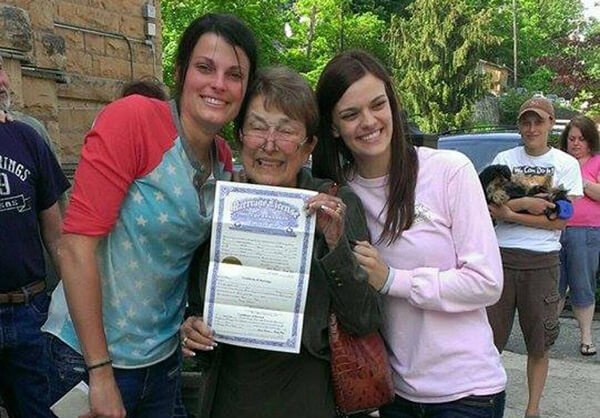The Appellate Court of Illinois has found that a state court judge who is a physician’s former same-sex partner can assert an unjust enrichment legal claim — that is, a palimony claim — to seek compensation for her financial contributions toward both the home they shared and the physician’s professional practice. The court’s December 19 opinion found that legislative and common law developments in recent decades rendered obsolete a 1979 Illinois Supreme Court decision that barred such lawsuits between former unmarried partners.
Jane Blumenthal and Eileen Brewer became domestic partners in the early 1980s when they were both graduate students at the University of Chicago. By the time their relationship ended in 2008, they had raised and cross-adopted three children together. By then, Blumenthal was a doctor in a lucrative partnership practice, and Brewer was an elected Illinois Superior Court judge. They merged their finances during their time together and had registered as domestic partners when that option became available in Cook County in 2003. They had also purchased real estate together, and Blumenthal used joint funds to buy into her medical partnership. After Blumenthal moved out, Brewer assumed all the costs of maintaining the house they had shared.
In 2010, Blumenthal filed a petition seeking to divide the value of the house, which they had purchased together, to reclaim her share. Brewer counterclaimed with a motion seeking sole title to the property to “equalize” the parties’ assets, since she had been a stay-at-home mom when their kids were young, Blumenthal’s medical partnership was purchased with their common funds, and Brewer had carried the financial burden of the house for two years after Blumenthal moved out.
Appeals panel recognizes unjust enrichment as cause of action open to former domestic partner
Blumenthal argued that the 1979 State Supreme Court precedent barred Brewer’s counterclaim, and Cook County Circuit Judge LeRoy K. Martin agreed and dismissed it.
Brewer, represented by the National Center for Lesbian Rights and Chicago attorney Angelika Kuehn, appealed with amicus support from the American Civil Liberties Union of Illinois and Lambda Legal.
When the state’s high court established its 1979 precedent, there were strong legislative policies in effect supporting its view that an unmarried cohabitant could not make the argument Brewer made in this case, including a statute criminalizing unmarried cohabitation. Court decisions at the time upheld that policy preference, disfavoring child custody for parents cohabiting outside of marriage.
Brewer argued that the legislative and judicial landscape in Illinois had changed so drastically that the 1979 precedent longer represented an accurate view of how state law should treat such a claim, and the appeals court agreed in an opinion written by Justice Margaret Stanton McBride.
“We find that the public policy to treat unmarried partnerships as illicit no longer exists, that Brewer’s suit is not an attempt to retroactively create a marriage, and that allowing her to proceed with her claims against her former domestic partner does not conflict with this jurisdiction’s abolishment of common law marriage,” the judge wrote.
McBride also pointed out that while the 1979 precedent sought to discourage unmarried cohabitation, it might in fact have the opposite effect.
“Refusing to hear claims between unmarried cohabitants creates an incentive for some to not marry,” she wrote. “A cohabitant who by happenstance or design takes possession or title to jointly-acquired assets is able to retain them without consequence when their ‘financially vulnerable’ counterpart is turned away by the courts.”
Despite the fact that Brewer and Blumenthal lacked the right to marry during the entirety of their long relationship — a right they would enjoy today — McBride wrote, “the legislature no longer disfavors their 26-year cohabitation or Brewer’s claims against Blumenthal… Brewer, who never had the option of marrying Blumenthal in Illinois, alleged that the couple intentionally comingled and shared their assets based on a mutual commitment and expectation of a lifelong relationship, that they divided their domestic and work responsibilities to best provide for the three children they had together, and that neither partner intended for their decisions and family roles to leave Brewer at a financial disadvantage later in life.”
The court, noting that its decision was in line with developments regarding palimony claims in other states, sent the case back to the circuit court “with directions to consider the parties’ remaining arguments.”




































